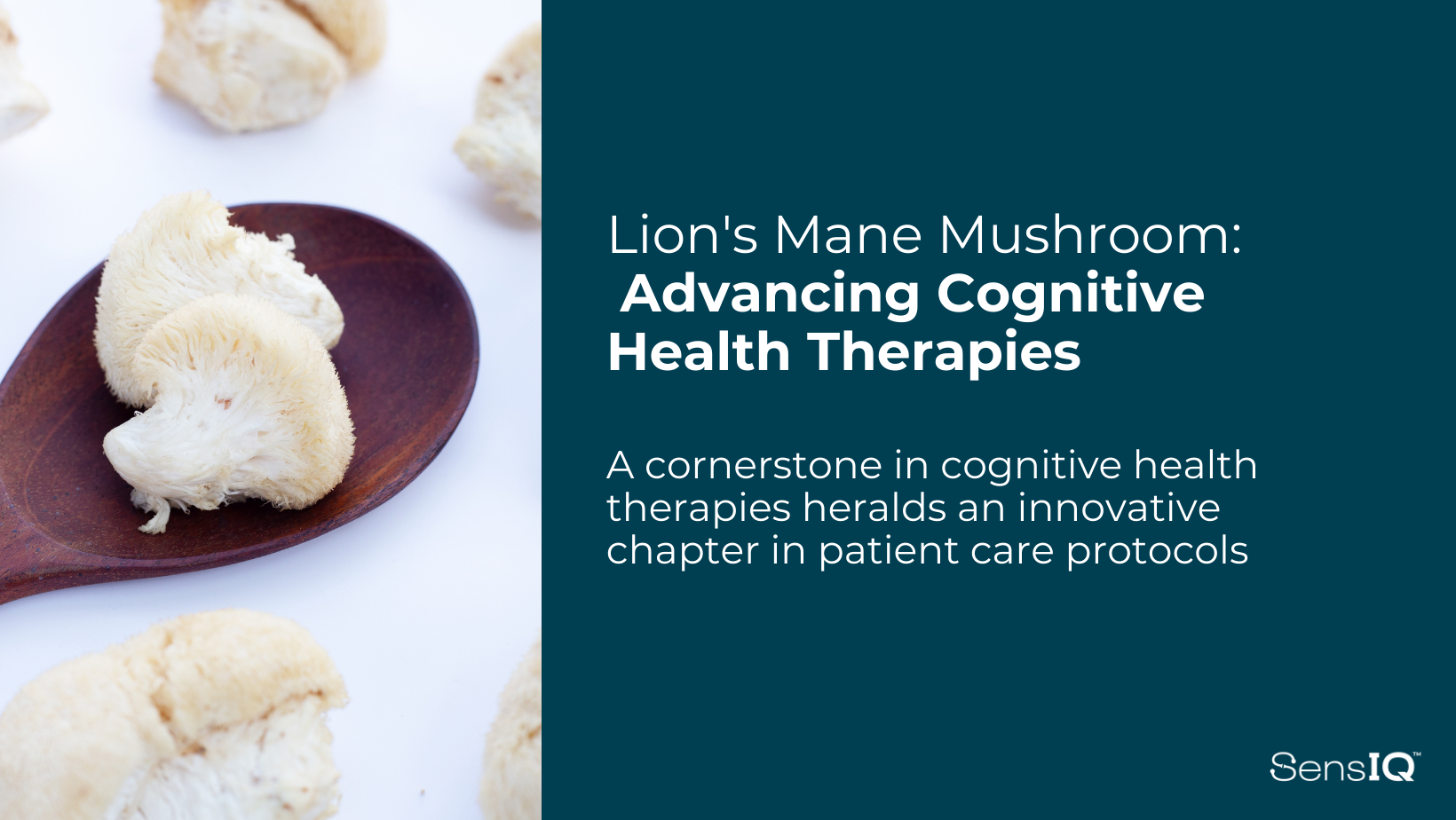The advent of Lion’s Mane Mushroom as a cornerstone in cognitive health therapies heralds an innovative chapter in patient care protocols. Healthcare practitioners are continually on the lookout for cutting-edge methods to ameliorate patient health outcomes, and Lion’s Mane Mushroom’s incorporation presents substantial therapeutic promise. This transformative approach in treatment methodologies introduces an advanced outlook on natural compound utilization to bolster patient health optimally.
Clinical Transformation with Lion’s Mane Mushroom
Revealing the Potency of Lion’s Mane Mushroom
Hericium erinaceus, commonly known as Lion’s Mane Mushroom, earns accolades for its profound health benefits in the cognitive and neurological spheres. Endowed with neuroactive compounds like hericenones and erinacines, this mushroom has been evidenced to catalyze neural cell growth. Scholarly research signifies that these substances may augment synaptic plasticity, a critical component for the assimilation of knowledge and recollection. Furthermore, Lion’s Mane is lauded for its efficacy in the amplification of nerve growth factor (NGF), an essential protein fostering neuron sustenance, survival, and recuperation. Lion’s Mane Mushroom emerges as an instrumental option in the arsenal against neurodegenerative ailments, offering healthcare professionals an innovative path for patient care strategies centered around neural health and cognitive capacity.
Pioneering Advances in Patient Therapies
Lion’s Mane Mushroom’s inclusion in medical treatments is recalibrating care tactics for cognitive health ailments. The augmenting adoption of this natural remedy in clinical settings is an acknowledgment of its therapeutic value. Individuals grappling with mild cognitive deficits have exhibited cognitive enhancements when incorporating Lion’s Mane into their therapeutic regimens. Notably, its provision as an alternative to pharmaceutical interventions with a lower side-effect profile constitutes a significant benefit for patients and caregivers alike. Its anti-inflammatory attributes are posited to play a preventive role against cognitive deterioration. For individuals at the initial stage of neurodegenerative conditions like Alzheimer’s, incorporating Lion’s Mane Mushroom might decelerate disease advancement, illuminating a pathway of hope for patients and their relatives. This transition highlights the accumulating substantiation of natural compounds in holistic patient treatment planning.
Reconceiving Healthcare through Lion’s Mane Mushroom
Harnessing Therapeutic Potential
Lion’s Mane Mushroom transcends the classification of a mere supplement; it is a dynamic entity adept at combating a spectrum of health issues. Its therapeutic scope extends from cognitive amelioration to digestive well-being, immunological support, and mood regulation. Polysaccharides in the mushroom have been shown to strengthen the immune defense, integral to comprehensive health maintenance. Additionally, its influence on gut microbiota points to an improvement in digestive health, crucial for patients with enduring gastrointestinal ailments. Early-stage research proposes Lion’s Mane’s merit in managing affective disorders, positioning it as a viable substitute to established antidepressants. This expansive therapeutic reach is prompting a reassessment of conventional treatment frameworks, and advocates for a more holistic perspective in patient care by synthesizing the essence of nature with contemporary medicine.
Validating Patient Benefits through Evidence
The curative uses of Lion’s Mane Mushroom garner support from a burgeoning repository of empirical data. Clinical investigations are documenting the nootropic advantages for those with neurologically based conditions. For instance, subjects with mild cognitive impairment report significant functional cognitive improvements subsequent to integrating Lion’s Mane into their diets. For healthcare practitioners deliberating over novel interventions, such scientific corroboration proves indispensable. Moreover, research alludes to its utility in neuronal injury recuperation, providing a beacon of hope for individuals suffering from peripheral neural damage. Lion’s Mane’s antioxidative makeup also underpins its neuroprotective properties, potentially attenuating oxidative stress linked with myriad neural pathologies. This substantial body of evidence is cementing Lion’s Mane Mushroom’s status as a valid, botanical complement to traditional medical treatments, enhancing its acceptance in patient care protocol.
Fusion of Science and Botany: Lion’s Mane’s Contribution to Cognitive Well-being
Augmenting Neurological and Cognitive Health
Lion’s Mane Mushroom’s integration into cognitive health strategies shows considerable promise in elevating neurological and cognitive outcomes. Neurotrophic elements within the mushroom stimulate neural cell development and repair, vital for patients experiencing cognitive decline. This translates to heightened mental acuity, attention, and memory preservation. For the elderly demographic, this marks a notable progression in cognitive health custodianship. Emerging studies intimate Lion’s Mane’s potential to alleviate symptoms associated with anxiety and depressive states, complementing its neurocognitive advantages. Consequently, Lion’s Mane solidifies its role in regimen protocols targeting quality of life enhancement via improved cognitive functioning. Continuous research propels the understanding of Lion’s Mane’s role in cognitive health, entrenching its significance as a fundamental botanical solution in neurological therapy.
Essential Function in Contemporary Patient Treatment
With the healthcare domain in a state of flux, Lion’s Mane Mushroom is assuming a key position in contemporary patient treatment. Its adaptability and favorable safety margin render it an alluring supplement to standard treatments, specifically within cognitive health’s domain. Clinical practitioners are identifying that the fusion of Lion’s Mane in treatment frameworks can introduce a synergistic method that is congruent with the body’s inherent healing mechanisms. This is paramount in an era trending toward individualized medicine. Patients increasingly desire therapeutic options that not only yield efficacy but also resonate with an organic lifestyle ethos. Lion’s Mane meets this criterion, equipping healthcare providers with a formidable resource that enhances pharmacological measures and catalyzes the body’s natural recuperative aptitudes. This pathway reflects a shift in treatment orientation that is based on a fusion of empirical science and age-old insight, heralding an integrated approach to patient care.
For those considering integrating Lion’s Mane Mushroom into cognitive health regimens or exploring additional natural health alternatives:
-
Engage with a SensIQ Consultant: Maximize the benefits of Lion’s Mane Mushroom and other botanical nootropics by enlisting the expertise of a qualified representative. A consultative dialogue is essential when altering treatment strategies. Schedule Your Consultation
-
Peruse Our Product Assortment: Examine our comprehensive selection of Lion’s Mane Mushroom solutions. Whether in capsule or tea form, integrate this versatile botanical into your daily health routine with ease. View Our Formulas
-
Stay Abreast of Developments: Subscribe to our newsletter for updates on pioneering research, novel products, and adept strategies for cognitive health optimization. Subscribe Today
In conclusion, Lion’s Mane Mushroom is increasingly recognized for its revolutionary role in cognitive health management. To begin your exploration of this exceptional natural intervention, Engage with a SensIQ Consultant. A personalized consultation can effectively match the advantages of Lion’s Mane with your exact health aspirations. Schedule Your Consultation


